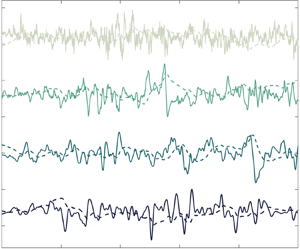Article contents
Modelling Lagrangian velocity and acceleration in turbulent flows as infinitely differentiable stochastic processes
Published online by Cambridge University Press: 11 August 2020
Abstract

We develop a stochastic model for Lagrangian velocity as it is observed in experimental and numerical fully developed turbulent flows. We define it as the unique statistically stationary solution of a causal dynamics, given by a stochastic differential equation. In comparison with previously proposed stochastic models, the obtained process is infinitely differentiable at a given finite Reynolds number, and its second-order statistical properties converge to those of an Ornstein–Uhlenbeck process in the infinite Reynolds number limit. In this limit, it exhibits furthermore intermittent scaling properties, as they can be quantified using higher-order statistics. To achieve this, we begin with generalizing the two-layered embedded stochastic process of Sawford (Phys. Fluids A, vol. 3 (6), 1991, pp. 1577–1586) by considering an infinite number of layers. We then study, both theoretically and numerically, the convergence towards a smooth (i.e. infinitely differentiable) Gaussian process. To include intermittent corrections, we follow similar considerations as for the multifractal random walk of Bacry et al. (Phys. Rev. E, vol. 64, 2001, 026103). We derive in an exact manner the statistical properties of this process, and compare them with those estimated from Lagrangian trajectories extracted from numerically simulated turbulent flows. Key predictions of the multifractal formalism regarding the acceleration correlation function and high-order structure functions are also derived. Through these predictions, we understand phenomenologically peculiar behaviours of the fluctuations in the dissipative range, that are not reproduced by our stochastic process. The proposed theoretical method regarding the modelling of infinitely differentiability opens the route to the full stochastic modelling of velocity, including the peculiar action of viscosity on the very fine scales.
Information
- Type
- JFM Papers
- Information
- Copyright
- © The Author(s), 2020. Published by Cambridge University Press
References
REFERENCES
- 15
- Cited by

